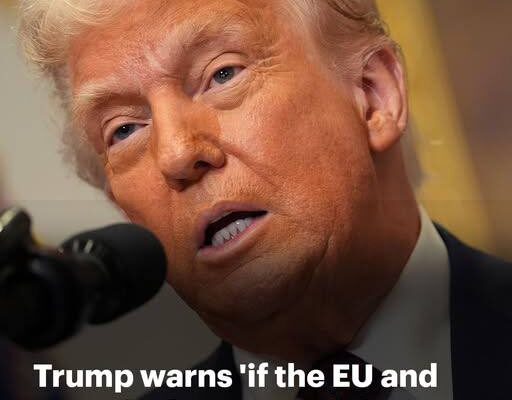Donald Trump has warned the European Union and Canada that they will face “large scale tariffs” if they attempt to cause “economic harm to the USA,” in a provocative post made early this morning.
The U.S. President intends to impose a 25% tariff on imported cars and light trucks starting April 3. Earlier this month, he also announced an increase in tariffs on all steel and aluminum imports from the European Union.
In response, the EU has planned retaliatory duties on U.S. industrial and agricultural products, set to take effect on April 1, potentially escalating into a damaging trade war.
Posting on his Truth Social platform this morning, Trump stated: “If the European Union collaborates with Canada to harm the U.S. economy, large-scale tariffs—far larger than currently planned—will be imposed on both, to protect the best friend each of those countries has ever had!”
Some European leaders and industry executives have called for mediation, urging EU-US talks to prevent an escalating economic conflict.
Sigrid de Vries, director general of the European Automobile Manufacturers’ Association (ACEA), said, “We urge President Trump to consider the negative impact of tariffs, not only on global automakers but also on U.S. domestic manufacturing.”
She added, “Tariffs will not only affect imports into the U.S., a penalty likely to be paid by American consumers, but measures on automotive parts will also hurt U.S. automakers producing cars for export markets.”
However, others seem determined to confront the U.S. economic penalties head-on.
French Finance Minister Eric Lombard told France Inter radio, “The hostility is increasing. The only solution for the European Union will be to raise tariffs on American products in response.”
Meanwhile, the UK is working to avoid escalating tensions with the U.S.
“We are not in a position where we want to escalate these trade wars,” Finance Minister Rachel Reeves told Sky News when asked about potential retaliatory tariffs against the U.S.
‘Trade wars are no good for anyone.’

US President Donald Trump announces tariffs on auto imports in the Oval Office of the White House in Washington, DC, on March 26, 2025

The US President plans to impose a 25% tariff on imported cars and light trucks starting next week

Trucks are lined up at a Ford plant after US President Donald Trump’s announcement of a 25% tariff on imported cars and light trucks starting next week
Washington’s new tariffs on cars and light trucks will go into effect next Thursday, the day after Trump is set to announce reciprocal tariffs targeting the countries responsible for most of the U.S. trade deficit.
These tariffs add to existing duties on steel, aluminum, and goods from Mexico, Canada, and China.
Britain has sought to avoid these tariffs, arguing that both nations report trade surpluses with each other—both in goods and services—due to measurement differences.
The UK is also pursuing a tech-focused agreement with the U.S. that it hopes will help shield it from direct tariffs on its exports.
Meanwhile, the EU was prepared for tariffs on steel and aluminum, but these new measures further strain already tense transatlantic relations.
In retaliation, the EU’s countermeasures will affect U.S. goods worth approximately 26 billion euros ($28 billion), not only targeting steel and aluminum, but also textiles, home appliances, and agricultural products.
Motorcycles, bourbon, peanut butter, and jeans—products hit during Trump’s first term—will be included.
However, the recently announced tariffs on car and light truck imports are likely to cause even more damage to Europe.
The automotive industry is a cornerstone of Europe’s economy, employing about 13 million people and contributing roughly seven percent to the EU’s GDP.
This month, the EU introduced a rescue plan for the sector, which the bloc’s industry chief described as being in “mortal danger.”
According to the ACEA, European manufacturers export between 50 and 60 percent of the vehicles they produce in the U.S., making a significant positive contribution to the U.S. trade balance.
The ACEA stressed, “The EU and the U.S. must engage in dialogue to find an immediate resolution to avert tariffs and the damaging consequences of a trade war.”

President Donald Trump speaks at the Business Roundtable quarterly meeting in Washington, Tuesday, March 11, 2025

European Commission President Ursula von der Leyen (L) and EU Commissioner for Trade and Economic Security, Interinstitutional Relations and Transparency Maros Sefcovic
European Commission President Ursula von der Leyen announced on March 12 that the EU would remain open to negotiations, despite the new tariffs.
“In response to the U.S. imposing tariffs worth $28 billion, we are implementing countermeasures worth 26 billion euros,” she stated. The European Commission handles trade and commercial disputes on behalf of the EU’s 27 member countries.
“Given the geopolitical and economic uncertainties in the world today, we firmly believe it is not in our mutual interest to burden our economies with tariffs,” von der Leyen added.
The Commission outlined that in addition to steel and aluminum products, the countermeasures would target textiles, leather goods, home appliances, household tools, plastics, and wood. Agricultural products such as poultry, beef, seafood, nuts, eggs, sugar, and vegetables would also be affected.
While Trump has claimed that the tariffs would help create jobs in U.S. factories, von der Leyen emphasized, “Jobs are at risk. Prices will rise. Both in Europe and the United States.”
She continued, “We deeply regret this measure. Tariffs are taxes. They are harmful to business and even worse for consumers. They disrupt supply chains and create economic uncertainty.”
During his first term, Trump imposed similar tariffs on EU steel and aluminum, which sparked anger among European allies. In response, the EU introduced countermeasures, raising tariffs on U.S.-made motorcycles, bourbon, peanut butter, jeans, and more.
The current EU response will come in two stages. First, the Commission will reinstate “rebalancing measures” that were in place between 2018 and 2020 but were suspended under the Biden administration. This will be followed by additional duties on $19.6 billion worth of U.S. exports to the EU.
EU Trade Commissioner Maros Šefčovič traveled to Washington last month to try to prevent the tariffs, meeting with U.S. Commerce Secretary Howard Lutnick and other top trade officials.
“I urged the U.S. to avoid the unnecessary burden of these measures, but you need a partner for that. You need both hands to clap,” Šefčovič told reporters at the European Parliament in Strasbourg, France.

A person shops through steel pieces at a metal supply business in Burbank, California, USA, 11 March 2025

United States President Donald Trump speaks in front of a Tesla Model S with Elon Musk, Tesla CEO and Senior Advisor to the President of the United States
According to Henrik Adam, president of the Eurofer European steel association, the EU could lose up to 3.7 million tons of steel exports due to the tariffs.
“This will further deteriorate the situation of the European steel industry, worsening an already challenging market environment,” Adam warned last month.
The United States is the second-largest export market for EU steel producers, accounting for 16% of total EU steel exports.
“Loss of a significant portion of these exports cannot be offset by EU exports to other markets,” Adam emphasized.
The EU estimates that annual trade between both regions amounts to approximately $1.5 trillion, or around 30% of global trade. While the EU enjoys a significant export surplus in goods, it acknowledges that this is partially balanced by a U.S. surplus in services trade.
In 2023, trade in goods between the EU and the U.S. totaled 851 billion euros ($878 billion), with the EU posting a trade surplus of 156 billion euros ($161 billion). Meanwhile, trade in services amounted to 688 billion euros ($710 billion), with the EU recording a trade deficit of 104 billion euros ($107 billion).
On the UK front, Business Secretary Jonathan Reynolds stated Wednesday that he would continue to engage “closely and productively” with the U.S. to advocate for British business interests.
He did not rule out future tariffs on U.S. imports, adding, “We will keep all options on the table and won’t hesitate to respond in the national interest.”
Center-left Prime Minister Keir Starmer has been working to strengthen ties with the U.S. in hopes of avoiding the tariffs imposed on other U.S. trading partners.
Reynolds also mentioned that the government remains “focused on a pragmatic approach” and is actively negotiating a broader economic agreement with the U.S. to eliminate additional tariffs and benefit UK businesses and the economy.



